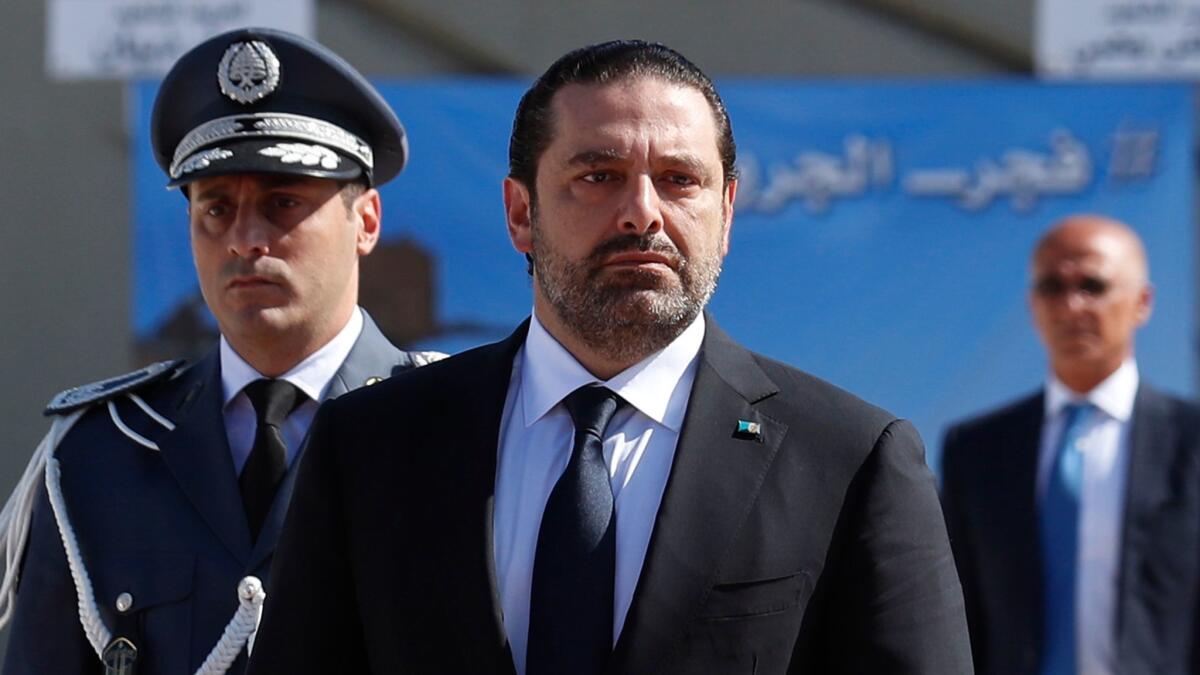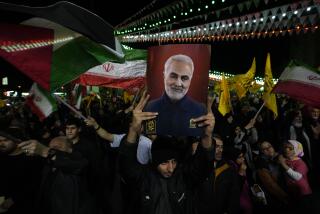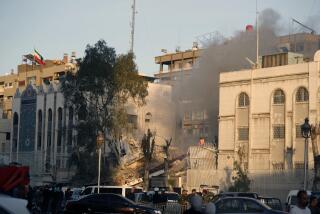Lebanese prime minister resigns amid tensions with Iran-backed Hezbollah

Lebanon’s prime minister, Saad Hariri, resigned Saturday during a trip to Saudi Arabia, where he launched a televised verbal attack on that country’s regional rival Iran, heightening a simmering fight for political control of Lebanon.
Hariri made the surprise announcement on the Saudi-state owned Al Arabiya news channel, leaving both his government and political allies baffled by the move. His resignation ends an 11-month run as prime minister that was meant to herald new cooperation between Lebanon’s Saudi-aligned parties and Iran-backed factions that include Hezbollah.
Hariri also claimed there had been an attempt to kill him.
“I sensed what was being conspired in the darkness to target my life,” said Hariri, adding that the atmosphere was similar to the time when Prime Minister Rafik Hariri — Saad Hariri’s father — was assassinated in 2005.
That killing, which was blamed on the Syrian government and Hezbollah, triggered the so-called “Cedar Revolution” that demanded an end to Syrian influence in Lebanese affairs.
Saad Hariri invoked his father’s memory, calling on the Lebanese people to reject external interference.
Yet he spoke from a strictly Saudi point of view, focusing his ire particularly on Iran as well as Hezbollah, the Iranian-backed Shiite party and armed faction that is arguably the strongest player in Lebanon’s fractious political landscape.
“Wherever [Iran] lands in an area, it plants in it disputes, destruction and ruin. This was witnessed in its meddlings in the internal affairs of the Arabic nations of Lebanon, Syria, Iraq, Bahrain and Yemen,” said Hariri, adding that Iran was driven by a “deep hatred” against Arab countries.
Hariri said “unfortunately” Iran has found Lebanese willing to cooperate with the country, and he criticized Hezbollah for possessing weapons and for intervening in neighboring Syria on the side of President Bashar Assad.
Hezbollah has long insisted its intervention was meant to prevent the chaos of Syria spilling across the border into Lebanon.
“And I want to say, Iran and its followers, that they are losing in their interventions in the affairs of the Arab nations,” said Hariri, vowing that what he called the Arab “umma,” or community, would rise once again and “the hands extended towards it with evil intent would be cut.”
“Just as it responded to you in Bahrain and Yemen, it will respond to you in every part of our precious umma.”
It was not clear what led to his resignation. The office of Lebanese President Michel Aoun issued a statement saying that Hariri had informed him of his resignation in a phone call, and that he awaited Hariri’s return so as to be informed “of the circumstances of the resignation.”
Hariri’s time in power was supposed to usher in a new understanding between the two regional superpowers and break the political deadlock that had hobbled the country’s government for years. With his family’s close ties to Saudi Arabia, he was seen as a counterbalance to Aoun, a Hezbollah ally who was picked by parliament to assume the country’s presidency.
Yet Hariri’s appointment followed a period of waning Saudi influence in Lebanon’s affairs. Last year, Riyadh canceled a $4-billion aid package to Lebanon’s security forces after Aoun defended Hezbollah’s possession of weapons.
Meanwhile, pro-Assad Lebanese politicians have been emboldened as the war in Syria shows signs of ending in favor of Assad, who also is backed by Iran.
A delegation went earlier this year to Damascus to discuss reconstruction plans for the country and how Lebanon could benefit from the potential windfall. And earlier this week, Beirut reestablished diplomatic ties with Damascus, further angering Riyadh.
Hariri’s resignation comes one day after a meeting with Ali Akbar Velayati, advisor to Iran’s Supreme Leader Ayatollah Ali Khamenei, in which, according to the official Iranian news agency IRNA, Velayati had stressed Iran’s support for the stability of Lebanon and its independence.
Regionally, the response to Hariri’s departure followed the fault lines created by the Saudi-Iran rift.
Israeli Prime Minister Benyamin Netanyahu, according to the Israeli daily newspaper Haaretz, said it was a “wake-up call for the international community to act against Iranian aggression,” accusing Iran of trying to “turn Syria into a second Lebanon.”
“This aggression not only endangers Israel, but the entire Middle East. The international community should unify and stand against this aggression.”
Iranian foreign ministry spokesman Bahram Ghasemi, in an interview with local media outlets, condemned Hariri’s resignation, saying it was based on “unfounded accusations by Zionists [a reference to Israel], Saudi Arabia and America, and was another attempt to create tensions in Lebanon and the region.”
Locally, Lebanese couldn’t resist pointing out the irony of a leader condemning external influence on his country on a foreign state-owned channel. Hariri’s critics also accused him of risking Lebanon’s stability to satisfy Saudi Arabia’s anti-Iran hubris.
But the main response was less derision than bewilderment — even among Hariri’s own Future movement, which seemed no less surprised by the announcement.
“Frankly, Lebanon is much too small and weak to bear the economic and political burdens of this resignation,” veteran Lebanese politician Walid Joumblatt said in a statement on Twitter on Saturday. “I was and will always remain one of those who calls for dialogue between Saudi Arabia and Iran.”
Bulos is a Times special correspondent.
UPDATES:
1:50 p.m.: This article was updated throughout with Time staff reporting and additional details.
This article was originally published at 9 a.m.
More to Read
Start your day right
Sign up for Essential California for news, features and recommendations from the L.A. Times and beyond in your inbox six days a week.
You may occasionally receive promotional content from the Los Angeles Times.







